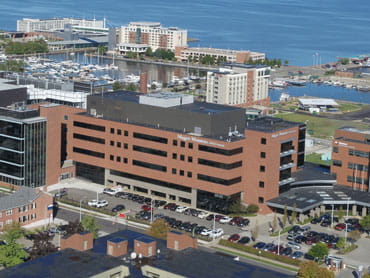Our ties to UPMC Magee-Womens Hospital in Pittsburgh means you have access to:
- The largest urogynecology program in western Pennsylvania.
- Leading urogynecology experts who offer in-person consults and treatment weekly in Erie.
- Virtual consults with these experts through telemedicine.
Our Services
What we offer
When your doctor refers you to our program, your first appointment will include:
- A consult, where we'll talk about your symptoms and medical history.
- Any testing to help us make the right diagnosis. These may include blood tests, imaging scans, or other tests.
You can receive the latest pelvis floor disorder treatments here in Erie, including:
- Botox shots for overactive bladder
- Vaginal hormone therapy
- Pelvic muscle strength training
- Lifestyle and behavior changes
- Pessary fittings or surgery for prolapse
- Medicine.
We can offer you the latest minimally invasive surgical techniques, including robot-assisted surgery, which leave you with:
- Less scarring
- Less pain
- Faster recovery times
Pelvic floor physical therapy options
UPMC Magee-Womens in conjunction with UPMC Rehabilitation Institute, offers a pelvic physical therapy program that provides individualized treatment to help women manage their pelvic floor symptoms throughout their lifetime.
Physical therapy for pelvic floor disorders may include:
Therapeutic exercise
Flexibility and/or strengthening exercises based on each patient’s individual needs. The goal is to always restore normal, pain-free activity.
Manual therapy
The gentle manipulation of tissue (muscles, connective tissue, scar tissue, nerves, etc.) that helps release restrictions and soften tense tissues.
Biofeedback
Allows patients to “see” their pelvic muscle activity at rest and tension produced during various strengthening or relaxation exercises. This helps increase awareness that they are using their muscles correctly, which is essential for correcting dysfunctional or uncoordinated muscle activity.
Functional activities
Addresses positioning, posture, and body mechanics, and includes:
- Bladder and/or bowel retraining.
- Functional pelvic bracing for incontinence and/or prolapse conditions.
- Device recommendations.
Modalities
- Transcutaneous Electrical Nerve Stimulation (TENS) consists of gentle and soothing pulses, applied via external electrodes, surrounding an area of pain. The stimulation prevents pain signals from reaching the brain and increases endorphin (the “feel-good” chemical) production. TENS decreases overall pain perception to assist with mobility and function.
- Electrical stimulation can strengthen pelvic muscles, inhibit overactive bladder conditions, and assist with correcting urinary retention.
- Ultrasound uses sound waves to generate heat within a body part, increasing circulation and decreasing inflammation within the region.
Research: Pelvic Floor and Bladder Disorders
UPMC is always conducting research to enhance our knowledge of pelvic floor and bladder disorders and design new treatments. In Erie, you may have the chance to take part in cutting-edge research studies.
Talk to your care team about what studies are available in the area and how you can sign up.

















